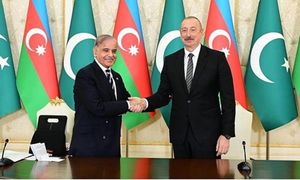The early 21st century is witnessing significant geopolitical shifts, characterized by tensions among major powers, particularly between the United States and China. With the return of Donald Trump to the presidency, the world is watching closely as these two nations grapple over economic dominance and territorial sovereignty.
The People’s Republic of China (PRC) has shifted its diplomatic tone, tempering its criticisms of the United States compared to its assertive ‘wolf warrior’ diplomacy of previous years. Official Chinese media have shown restraint when covering Trump's inauguration, relegated to page 16 of the People’s Daily, highlighting Beijing's changing stance and signaling its desire to manage international relationships amid its ambitions to assert leadership over the Global South (People’s Daily, January 21). This strategic pivot indicates confidence from the PRC about exiting the post-Cold War U.S.-led global order.
According to analyses, Chinese officials believe the global trend favors the decline of the United States, with the PRC eager to shape events more assertively and ideologically. Beijing has been vocal about its commitment to preserving the existing international order, as noted by one scholar who stated, “China maintains the current international order and also shapes the future international order” (People’s Daily, January 27).
Meanwhile, Trump’s foreign policy posture seems poised to return the U.S. to unilateralism. At the World Economic Forum held shortly after his inauguration, Trump emphasized direct dealings over international coalitions, stating, "I love Europe. I love many of the countries in Europe. But the process [of dealing with the EU] is cumbersome,” thereby laying foundations for potential economic conflicts (WEF, January 2025). Trump's administration has already hinted at leveraging tariffs and economic pressures as primary tools for negotiating international relations.
With Trump’s previous term marked by nationalist rhetoric and skepticism of multilateral organizations, there exists concern about the potential for amplified tensions with European allies. European leaders have expressed unease over Trump’s emphasis on 'peace through strength', which often translates to economic coercion rather than collaborative diplomacy (Davos, January 2025). Nations like Poland are ramping up military expenditures, preparing more assertively amid NATO's uncertain security guarantees (Reuters, January 2025).
Trump's resurgence could revive discussions about the U.S.-Russia relationship, where speculation swirls around Putin's potential for intimidation through military showcases, especially relevant to the continuing conflict in Ukraine. Reflective of past provocations, Trump’s administration might push for negotiations favoring U.S. interests with Ukraine seen as the pawn, potentially leaving it vulnerable should discussions not align with American objectives.
Globally, the geopolitical struggles display the emergence of ‘gray zone’ conflicts, where traditional war narratives dissolve. Soft and hard power will clash as international actors maneuver for dominance, often employing strategies beyond conventional armies, including cyber warfare, economic sanctions, and propaganda (Saldaña Sagredo, January 2025). These multifaceted challenges may resemble the chaotic environment of pre-World War II Europe, according to analysts.
Technology's role is also central to future conflicts, with cyber capabilities and artificial intelligence revolutionizing how wars are fought and data leveraged for national strategic gains. Uncontrolled advances risk plunging nations deep within new forms of combat fundamentally reshaping our perception of friendship and enmity.
Despite rising tensions, economic ties remain significant, with China's strategic partnerships benefitting from its position as the world's factory (China Brief, April 2024). Understanding the international fabric of trade, particularly raw materials and technology, will determine the balance of power as nations pivot away from traditional routes. The 'Global South,' rich with resources and opportunities, is becoming increasingly contested (Article 2, January 2025).
Finally, the European Union's precarious position will also frame much of the discourse around 21st-century geopolitical tensions. Analysts note Europe may struggle without U.S. leadership, slipping back toward age-old rivalries, as countries reassess their security without the reliable support of the U.S. umbrella (Davos, January 2025). Current economic crises and involvement from external parties may catalyze radical shifts, incorporating class struggles previously muted by economic globalization.
What lies ahead hinges significantly on how the U.S. navigates its relationships under Trump's leadership matrix. With each player positioning themselves for relative gain, the month-to-month developments will likely reshape expectations about global governance, sovereignty, and national superiority, reflecting the broader dysfunctions and divides within and beyond the United States.



